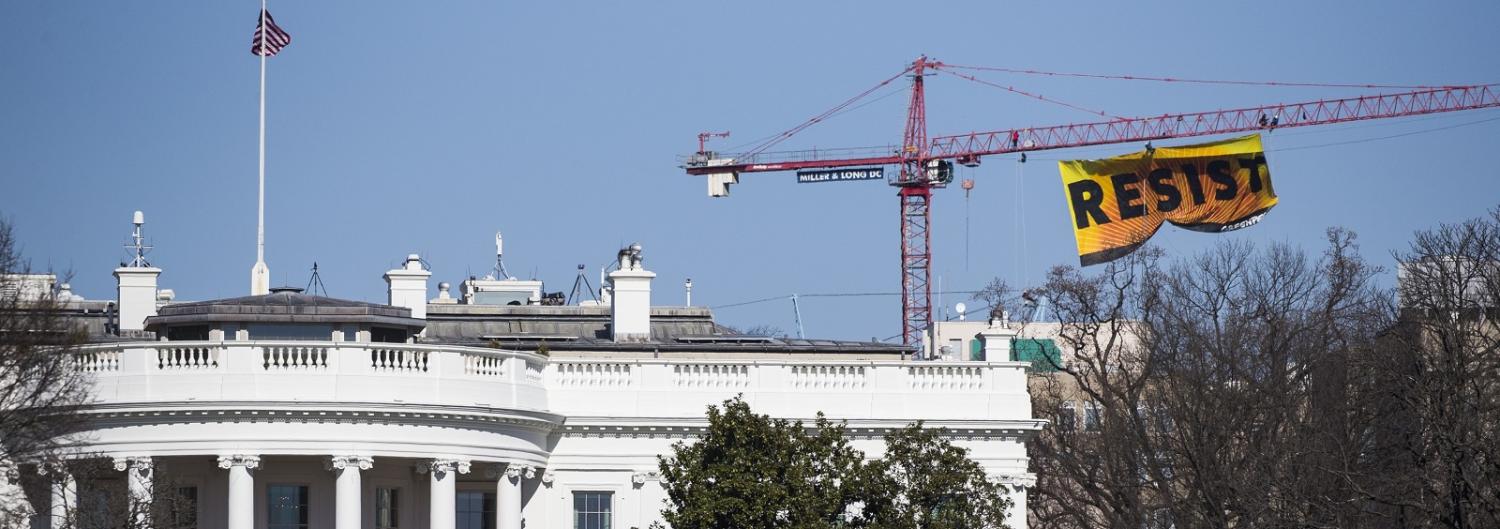The oft-repeated promise by Donald Trump when he was on the campaign trail last year to abolish the Environmental Protection Agency is now described as an 'aspirational goal' as the newly-installed Trump administration takes the measure of widespread opposition.
As previous Republican presidents have discovered, many regulations cannot be changed by the stroke of a pen. Both Ronald Reagan and George W Bush come to office hoping to abolish key EPA regulations but were blocked by the bureaucracy and environmental groups skilled at litigation.
In these early days of the Trump Administration, the EPA is still engaged in what will be no doubt come to be viewed as preliminary skirmishes. There have been reports EPA staff have been instructed to take down the EPA page on climate change, and accounts of scientists frantically copying data held by the agency, in case the new administration tries to corrupt or destroy it.
As of this week, the EPA site page on climate change was still there, complete with stories such as 2016 being the hottest year on record, climate change primers for school children and links to data.
Once President Trump's nominee to head the agency, Scott Pruitt, is finally confirmed in his new job, it's safe to assume the battle will begin in earnest. Democratic Senators have done their best to delay the nomination, pointing out that Pruitt denies the science of climate change and has been a notorious opponent of the EPA. As attorney general for the oil producing state of Oklahoma, he has sued the agency more than half a dozen over new regulations, only to lose every time.
Despite Democrat delaying tactics Pruitt’s nomination is expected to be confirmed. But even with Pruitt at the helm of the EPA, it will still be difficult to make the wholesale changes feared by the climate establishment, at least as far as getting rid of regulations already legislated.
Jody Freeman a Harvard Law professor and a former White House staffer in the Obama administration points out all rules changes have to go through a process of draft amendments which then have to be published and public comments sought and considered. This notice and comment period takes at least a year and sometimes two. Any subsequent changes can then be challenged in court, requiring the agency to defend the alterations as not 'arbitrary or capricious'.
This will be particularly difficult in the case of the controversial 2009 endangerment finding in which the EPA declared that greenhouse gases are harmful to health. This finding was made to give the agency power to regulate such gases, to get around the difficulty of passing legislation in that area. In making the case the EPA assembled considerable scientific evidence, which the courts will not ignore in any legal objection to the regulation being abolished. In fact, Pruitt has already declared that he will be obliged to honour the endangerment finding.
However, the Trump administration can also simply defund enforcement of rules that it does not like. Although budgets have to go through the legislature, such changes can be slipped into larger bills that are less likely to be subject to the filibuster.
And the new administration will also be able to abolish or suspend EPA regulations that have not been put into effect. One of these is the Clean Power Plan which required individual states to set targets for the substantial reduction of emissions from electricity generating plants. This was presented to the Paris international climate meeting as a centrepiece of US efforts to fight emissions, but it is still wending its way through the court system. If the Trump administration has anything to do with it, will remain in the court system. (As Oklahoma attorney-general Pruitt was part of an ongoing legal challenge to this plan.)
Abandoning America’s role in the various international deals on greenhouse gases is much simpler. President Trump will have to do little more than declare Obama-era agreements, which were presidential agreements rather than treaties, invalid. The US obligations under the Paris treaty are in any case only to produce a set of greenhouse targets. A set of targets can be produced, then ignored.
Government agencies can also be told to no longer take into account climate change when compiling the environmental impact statements which are now required for new rules, and to change the way the social cost of carbon is calculated. The social cost is an estimated cost of the damage carbon emissions do the economy overall.
President Trump wants to do more than change those administrative details, however, and appears more determined than his republican predecessors. The Pruitt nomination, far more provocative than the appointment of any previous president, indicates that determination. As far as green groups are concerned, it is akin to placing the devil in charge of the Vatican. But both men face fierce opposition both within the EPA and from groups skilled in the activist tactic of ‘lawfare’. As Pruitt’s own record shows, the bulk of legal challenges in the environmental area have been decided in favour of those green groups. The war will be long and bloody and Trump forces will be fighting uphill against a very determined enemy.

